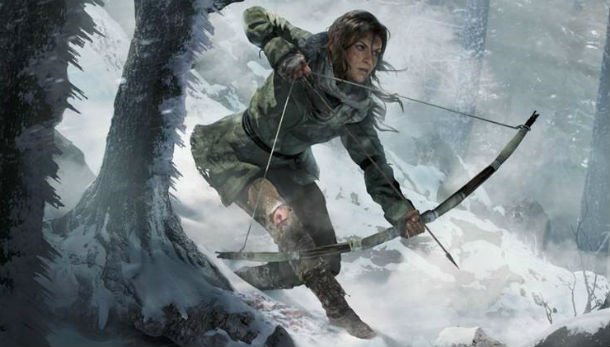
Well, I guess this is adieu then Lara. Today's news from Gamescom that Rise Of The Tomb Raider will launch “exclusively on Xbox” next year means that, at best, PC gamers will have to wait out whatever window of time Microsoft's money hat has paid for. Irritating, but nothing we're not used to. More troubling is the suggestion that this is actually a lifetime exclusive . If that is the case [Update: we now know, as suspected, that it isn't ], then it would represent one of the dumbest partnership deals I can recall.
A number of things don't make sense. For starters, Tomb Raider has no track record of shifting systems. Other than the original game launching first on Sega Saturn (which didn't alter that console's fortune much), Raider has always been a multi-platform proposition at launch. Even if the series might have been capable of selling machines single-handed in its heyday, it surely no longer holds anything like the same grip on gaming's popular consciousness that it once did.
Last year's reboot eventually went on to sell over six million copies , but initially it fell disappointingly short of Square's expectations. That doesn't sound like a fanbase which is going to rush out and drop $400/£350 on an Xbox One just for another slice of Croft.
In fact, I'm not convinced there are many games capable of creating that sort of reaction single-handed. An exclusive GTA or a new single-player Elder Scrolls would. Perhaps the next Fallout might. Maybe if Madden or FIFA went single format… But there's a very good reason why all those games are available on every system capable of running them from day one: genuine blockbusters benefit from being available to as many people as possible.
Indeed, the cost of AAA development all but makes it a necessity. By entering into this deal, Square Enix is essentially accepting that it stands to gain more from Microsoft's financial support (this sort of deal is often structured to include guaranteed marketing spend on things like TV ads) than it does from just selling the game to everybody.
But don't take my word for it, here's how Darrell Gallagher, head of studios at Crystal Dynamics, explained the decision to get into bed with Microsoft on the Tomb Raider Tumblr :
“We know they will get behind this game more than any support we have had from them in the past—we believe this will be a step to really forging the Tomb Raider brand as one of the biggest in gaming, with the help, belief and backing of a major partner like Microsoft. This doesn't mean that we're walking away from our fans who only play on PlayStation or on PC. Those are great systems, with great partners, and amazing communities. We have Lara Croft and the Temple of Osiris coming to those platforms…”
Keep up to date with the most important stories and the best deals, as picked by the PC Gamer team.
Okay, we get it. Tl;dr is: “We are extraordinarily risk-averse. Kerching! ” But the sad thing is that rather than helping to reassert the brand, the decision to artificially limit Rise of the Tomb Raider's audience—even if it does prove to be temporary—surely only confirms that Raider no longer belongs amongst gaming's top tier. Look at it this way: There's almost no amount of money that Microsoft could realistically offer Ubisoft to make Assassin's Creed Unity an Xbox exclusive. And the reason is that it's simply a bigger game, with an exponentially bigger upside to being on all formats.

What this deal really tells us, then, is that this is not so much a marriage of convenience between Square and Microsoft as one of desperation. Having misguidedly tried to foist a voice-controlled televisual utopia onto console gamers, Microsoft is now struggling to claw back the core gaming ground it lost to Sony's now dominant PS4. But if having a sexy new shooter like Titanfall didn't turn the dial for Microsoft sufficiently, I see little reason to expect another Tomb Raider to do so.
Square, meanwhile, returned to profitability this year off the back of some brutal cost-cutting and a cluster of high profile releases, (including Tomb Raider), but expects that recent growth to slow with a lighter release schedule. For them, making this deal, and the guaranteed revenue it represents, may represent financial security.
But for anyone who likes Tomb Raider and doesn't already own an Xbox One, it's bad news. (And sure enough, here comes the furious petition .) As someone who grew up fighting in the console trenches, I'm glad these sort of exclusivity deals have largely become extinct. They restrict choice, fuel fanboyism, and ultimately harm developers because they stop good games being experienced by the biggest number of people possible. As for the benefit to Xbox One, its perception problems surely run deeper than any adventure game, however decent, can solve.
There will, of course, always be first-party exclusives like Uncharted and Halo, because the platform holders need ways for gamers to differentiate between their (technically, increasingly similar) boxes, but third-party games really have no business tying themselves to one system any longer. I remember interviewing Hideo Kojima about Metal Gear Solid 4 during the PS3 era, and it was clear he didn't enjoy having his baby stuck on a single platform. The only time that makes sense is in the case of something like Bayonetta 2 for Wii U, where it's the sort of boutique project that probably wouldn't get made without the support of a benefactor with deep pockets. That surely shouldn't be the case when for a game like Tomb Raider, though.
Ultimately I expect Rise of the Tomb Raider will arrive on PC, probably in some sort of gussied up 'Game of the Year' edition. Certainly it's hard to find many exclusive deals that didn't eventually expire. The original Mass Effect appeared on PC a year later. Dead Rising 3 will take even less than that to arrive. I suppose the bigger question is how much of their bloom do these games lose during their enforced absences. But while it's a shame to have to wave goodbye to the new look Lara for a while, we aren't exactly going to be short of options in her absence. Last time I looked, Steam was reasonably well stocked …
With over two decades covering videogames, Tim has been there from the beginning. In his case, that meant playing Elite in 'co-op' on a BBC Micro (one player uses the movement keys, the other shoots) until his parents finally caved and bought an Amstrad CPC 6128. These days, when not steering the good ship PC Gamer, Tim spends his time complaining that all Priest mains in Hearthstone are degenerates and raiding in Destiny 2. He's almost certainly doing one of these right now.


